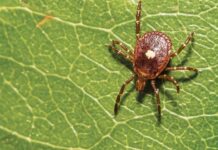MALVERN, Ohio – At the farmers’ markets near Akron and Cleveland, customers sometimes approach a couple toting coolers and call out to Rose or Ridge.
“Hey, Rose, those were the best steaks we got from you last week!”
Or “Hey, Ridge, what’s in the cooler today?”
Those aren’t their names, but Deanna and Dave McMaken don’t mind. Their marketing plan is working, even if customers think the farm name, Rose Ridge Farm, is a play on its owners’ names.
The point is, their suburban and urban customers recognize where their steaks or hamburger come from and how they’re raised. It’s organic, wholesome, pasture-raised beef straight from Carroll County.
Logic. Cattle are ruminants.
That, says Deanna McMaken, means the animals are meant to roam and graze, not stand in a feedlot while a farmer shovels corn into their mouths.
And, by grazing, they are allowed to pace their own growth and monitor their own health. It takes the pressure off the farmers to push their animals toward market and gives them a good feeling about how they treat their herd.
The feel-good mindset and the consumer market that embraces it pushed McMaken and her husband, Dave, to a full-time quest to raise enough organic beef to meet their demand.
The McMakens estimate they sell about 30 grown cattle direct to the consumer every year.
And on some market days, the coolers empty quickly and let the McMakens know their beef is just what consumers want.
In her blood. All the Robertson family has ever done is farm.
So it’s natural that the fifth generation on this homestead – Deanna Robertson McMaken and husband Dave, who grew up on a Miami County dairy – would farm, too.
The McMakens retired to the farm just more than 10 years ago to get their hands dirty with family tradition. They made the decision to keep the farm as authentic and manageable as it’s been for generations, with one small change: They’d go organic.
“It’s what we believe in,” Deanna McMaken says. Not to mention, she says, prices earned for organic foods are considerably higher than for straight commodities.
If we’re going to farm, let’s at least try something that will be sustainable, they thought.
So, keeping with the more than 100-year tradition, the McMakens began the process of converting the herd of 20 Horned Herefords they inherited from her father into a certified organic herd.
They were already set up for success, Deanna McMaken says: Worldwide, Herefords are one of the best-performing breeds on pasture. Plus, they’re very maternal, their meat marbles easily, and the animals are calm enough to let the McMakens work with ease.
Full circle. Deanna McMaken recalls her childhood on the farm, recounts memories of her family’s change from horsepower to tractors, of a small herd of dairy cattle, hogs and chickens, her grandfather’s apple orchard.
Those animals and the orchard let the Robertsons feast on fresh foods year-round. And that movement, to buy locally and eat in-season, has come full circle and opened doors for them, McMaken says.
“These days, ‘local’ means 100 miles from here,” McMaken says. “The market is already there, with people ready to support local agriculture and eat good food.
“Why should everyone’s beef come from a feedlot 2,000 miles away?”
Getting it right. Today, the herd has grown to about 120 head, a size the McMakens call just right.
And each of those animals is raised in a natural and organic way, beginning on the day they’re born.
The basis for the McMakens’ farm is health, they say, and it all starts in the nearly 450 acres they use to support the herd.
“Organic farming starts in the soil. If you get the soil in good shape, your animals will be healthy,” Dave McMaken says. “A healthy cow will raise a healthy calf.”
In growing the hay, ear corn, oats, spelts, barley, rye, or purchasing kelp and mineral supplements used to feed the herd, they keep in mind their end product and the steps it takes to get there.
“We’re always careful not to compromise our animals or their feed,” Dave McMaken says.
He hand-grinds their feed in small batches a couple times per week instead of once a month, and in place of dumping premixed feed from a bag. It’s his way of keeping all the nutrition in the feedbunk.
But the herd is mostly raised on hillside pastures that surround the farmstead in northwest Carroll County. Every animal on the farm likely gets grain at some point in its lifetime, but it’s a small amount, and stretched over time, the McMakens say.
“Grain is never our primary food. We’re trying to grow the animals, not fatten them.”
Performance. The couple also takes steps to keep their animals at peak performance: lots of trees in the pastures for shade, moving animals to fresh grass in new paddocks, weaning later, professional hauling.
Once cattle are harvested around 22 months of age, their local butcher lets the meat age three weeks to what the McMakens call perfection.
“The marbling is just right, it’s tender, the meat is good,” Deanna McMaken says.
Marketing. The Rose Ridge Farm label graces strip steaks and rump roasts hauled from here to farmers’ markets in Akron, Peninsula, Crocker Park in Westlake and North Royalton.
And the consumers there eat them up.
“We hear regularly, ‘I don’t eat grocery store beef,’ from our customers,” Deanna McMaken says.
“We didn’t create that, the large feedlots and grocery stores did. We’re here providing an alternative.”
“All we can do is wave our little flag and say this is really good food,” she says.
Farm-raised, fresh, local. The coolers are empty. It must be good.
(Reporter Andrea Myers welcomes reader feedback by phone at 800-837-3419 or by e-mail at amyers@farmanddairy.com.)
Get 4 Weeks of Farm and Dairy Home Delivered









